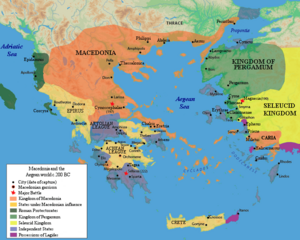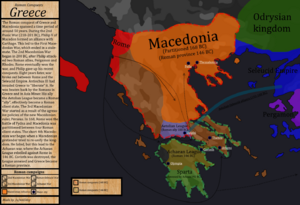Macedonian Wars facts for kids
|
|
The Macedonian Wars were a series of big fights between 214 BC and 148 BC. They involved the Roman Republic and its friends in Greece. They fought against powerful Greek kingdoms in the eastern Mediterranean Sea.
These wars helped Rome gain control or influence over Greece and the eastern Mediterranean. Rome was already strong in the west after the Punic Wars. The "Macedonian Wars" usually mean four wars against Macedonia. They also include one war against the Seleucid Empire. There was also a smaller war with the Achaean League.
The war with the Seleucid Empire was the most important. The war with Macedonia was the second most important. These wars greatly weakened both empires. Rome fought Macedonia four times because it was close by. The last two wars were against smaller uprisings. Rome slowly took over Macedonia. The war with the Seleucid Empire also weakened it a lot.
After these wars, the eastern Mediterranean had many different states. Some were independent, some depended on Rome, and some were directly controlled by Rome. A historian named Polybius said that Rome got involved because some Greek cities asked for help. They wanted protection from Macedonia and the Seleucid Empire. This happened because Ptolemaic Egypt was getting weaker.
In the east, big empires had ruled for a long time. Rome's alliances and wars weakened these empires even more. This created an unstable situation. Only Rome was strong enough to bring peace. This was similar to what happened in Italy much earlier, but on a much larger scale. Historians think Rome's growing influence was not planned. Instead, Rome was just dealing with constant problems. They focused on short-term goals in a very unstable world. The eastern Mediterranean remained a mix of independent states and kingdoms. This lasted until it became part of the Roman Empire. It was only then that the whole Roman world was organized into provinces under Rome's clear control.
Contents
First Macedonian War (214 to 205 BC)
During the Second Punic War, Philip V of Macedon became friends with Hannibal. Rome was worried that Philip might send help to Hannibal. So, the Roman Senate sent an army across the Adriatic Sea.
Roman soldiers, helped by allies, only had small fights with Macedonian forces. They took over a few small areas along the Adriatic coast. Rome did not want to conquer Macedonia. They just wanted to keep Macedonia busy while Rome fought Hannibal.
The war ended in 205 BC with the Treaty of Phoenice. Nothing was really decided. Even though it was a small war, it allowed Rome to get involved in Macedonia later. This war was mostly separate from the later Roman-Macedonian wars.
Second Macedonian War (200 to 196 BC)
For about 100 years, the Greek world was ruled by three main kingdoms. These were parts of Alexander the Great's old empire. They were Ptolemaic Egypt, Macedonia, and the Seleucid Empire. The Seleucids wanted to expand their empire after 230 BC. This made things unstable.
The Seleucids tried to conquer Egypt. Egypt fought back and won. But in 205 BC, the young Ptolemy V became king of Egypt. The Egyptian army then started fighting among themselves. This led to a big civil war. Seeing this, Macedonia and the Seleucids made a deal. They planned to conquer Egypt and divide it between them.
This plan was a huge threat to the Greek world's stability. It especially threatened the smaller Greek kingdoms. Macedonia and the Seleucid Empire were causing the trouble. Egypt was too weak to help. So, the only place to turn was Rome. This was a big change. Greeks had not liked Rome much before, and Rome had not cared much about Greece.
Ambassadors from Pergamon and Rhodes told the Roman Senate about the deal. They said Philip V of Macedon and Antiochus III of the Seleucid Empire had signed a pact. The exact details are not clear. We also do not know exactly why Rome got involved after many years of not caring about Greece. But the Greek visitors succeeded.
At first, Rome did not want to fight Macedonia. They just wanted to help their Greek friends through talking. Rome told Philip to stop fighting Rome's new Greek allies. Philip did not believe Rome was strong. He ignored their request, which surprised the Romans. Rome felt its honor was at stake. So, they sent an army of Romans and Greek allies. This started the Second Macedonian War.
Surprisingly, Philip's army struggled against the Roman-Greek army. Roman troops, led by Titus Quinctius Flamininus, reached Thessaly by 198 BC. In 197 BC, the Romans completely defeated Philip at the Battle of Cynoscephalae. Philip then asked for peace.
In the Treaty of Tempea, Philip V was told not to interfere outside his borders. He also had to give up his recent Greek conquests. At the Olympiad in 196 BC, Rome announced the "Freedom of the Greeks." This meant Rome thought Greece was now stable. Rome believed it could leave Greece without causing more problems. Rome seemed to have no more interest in the area. They pulled out all their soldiers. They went back to not caring, even when their Greek allies ignored later Roman requests.
Seleucid War (192 to 188 BC)
With Egypt and Macedonia now weaker, the Seleucid Empire became very aggressive. It tried to conquer all of the Greek world. When Rome left Greece after the Second Macedonian War, they thought they had left peace. But by weakening the only power that could stop the Seleucids, they actually caused more trouble.
Now, Rome's allies against Philip asked Rome for help against the Seleucids. Even Philip himself wanted to be Rome's friend. The situation got worse because Hannibal was now a main military advisor to the Seleucid emperor. People thought they were planning to conquer not just Greece, but Rome too.
The Seleucids were much stronger than Macedonia. They controlled much of the old Persian Empire. They had almost put back together Alexander the Great's old empire. Rome feared the worst. They started a huge military buildup. They even pulled soldiers out of Spain and Gaul. They set up a big army base in Sicily in case the Seleucids invaded Italy.
Rome's Greek allies also shared this fear. They had mostly ignored Rome after the Second Macedonian War. But now, they followed Rome again. A large Roman-Greek army was gathered. It was led by Scipio Africanus, a hero from the Second Punic War. This army set out for Greece, starting the Roman-Syrian War.
After some early fights, the Seleucids showed weaknesses. They tried to use Rome's strength against them at the Battle of Thermopylae. They thought they could win like the 300 Spartans had against the Persian Empire centuries earlier. But like the Spartans, the Seleucids lost the battle. They were forced to leave Greece.
The Romans chased the Seleucids by crossing the Hellespont. This was the first time a Roman army had ever entered Asia. The main battle was fought at the Battle of Magnesia. Rome won completely. The Seleucids asked for peace. Rome made them give up their recent Greek conquests.
Even though they still controlled a lot of land, this defeat was the beginning of the end for the Seleucid Empire. They started facing more aggressive groups in the east (the Parthians) and west (the Greeks). Their empire slowly fell apart over the next century. After Magnesia, Rome left Greece again. They hoped that without a major Greek power, there would be peace. But it caused the opposite.
Third Macedonian War (172 to 168 BC)
When Philip died in Macedon in 179 BC, his son, Perseus of Macedon, tried to make Macedonia powerful again. He moved aggressively against his neighbors. When Perseus was linked to a plot against a Roman ally, the Senate declared the Third Macedonian War.
At first, Rome did not do well against the Macedonian forces. But in 168 BC, Roman soldiers crushed the Macedonian phalanx at the Battle of Pydna. Rome was now convinced that Greece would never be peaceful if left alone. So, Rome decided to create its first permanent base in the Greek world. The Kingdom of Macedonia was divided by the Romans into four smaller, friendly republics. But even this was not enough for peace, as Macedonians continued to cause trouble.
Fourth Macedonian War (150 to 148 BC)
The Fourth Macedonian War was fought from 150 BC to 148 BC. It was against a Macedonian who claimed to be king, named Andriscus. He was trying to bring back the old Kingdom, which made Greece unstable again. The Romans quickly defeated the Macedonians at the Second Battle of Pydna.
In response, the Achaean League started a new war against Rome in 146 BC. This is sometimes called the Achaean War. It was very short and happened right after Macedonia fell. Before this, Rome had only fought in Greece to deal with Macedonian forts or allies. Rome's military was clearly superior. They had defeated Macedonia three times. They had also beaten larger armies of the Seleucids in Asia.
The Achaean leaders almost certainly knew that fighting Rome was hopeless. Rome had won against much stronger enemies. The Roman legion had proven better than the Macedonian phalanx. But a strong sense of national pride pushed the League into this bad decision. The Achaean League was quickly defeated. As a lesson, Rome completely destroyed the city of Corinth in 146 BC. This was the same year that Carthage was destroyed. After almost a century of constant problems in Greece, Rome decided to divide Macedonia into two new Roman provinces: Achaea and Epirus.
See also
 In Spanish: Guerras macedónicas para niños
In Spanish: Guerras macedónicas para niños
 | Stephanie Wilson |
 | Charles Bolden |
 | Ronald McNair |
 | Frederick D. Gregory |



